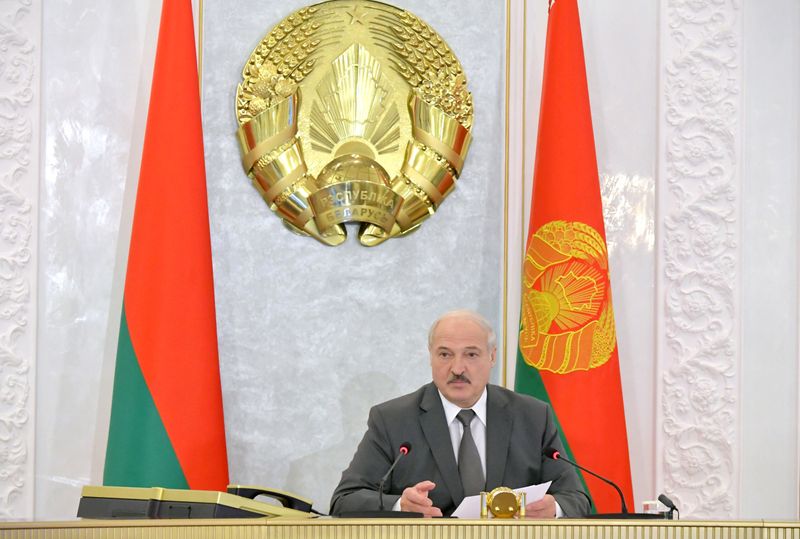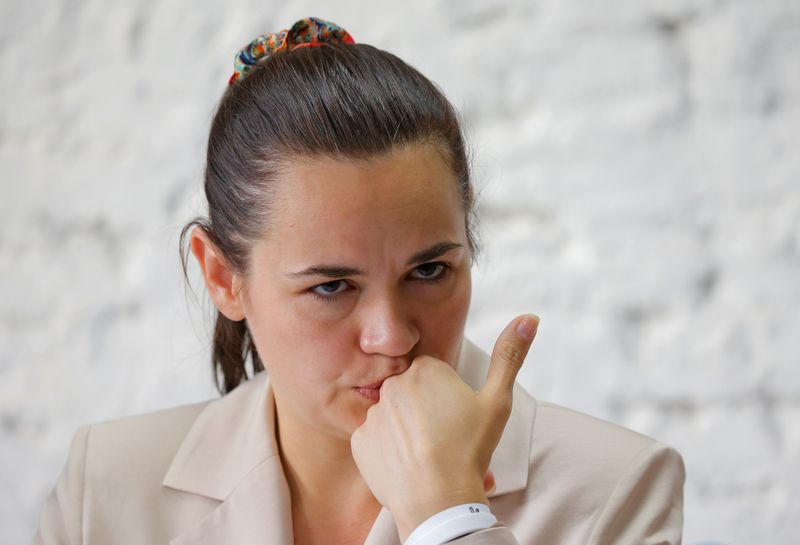By Andrei Makhovsky and Gabriela Baczynska
MINSK/BRUSSELS (Reuters) - Belarusian President Alexander Lukashenko ordered his police on Wednesday to put down protests in the capital Minsk, signalling an escalation after a week and a half of mass demonstrations against his rule.
Lukashenko's order came as European Union leaders held an emergency summit over the political crisis in Belarus, long Russia's most loyal neighbour, which has heavily militarised borders with EU member states Poland and Lithuania.
EU leaders were expected to endorse sanctions on Belarusian officials they blame for election fraud following a disputed Aug. 9 election that the opposition said it won.
"There should no longer be any disorder in Minsk of any kind," Lukashenko said in remarks reported by the official Belta news agency. "People are tired. People demand peace and quiet."
Facing the biggest challenge of his 26-year rule, he ordered border controls to be tightened to prevent an influx of "fighters and arms". Workers at state media who quit in protest against government policies will not be rehired, he said.
Lukashenko, 65, also ordered intelligence agencies to continue searching for organisers of the street protests, Belta reported.
The EU leaders are treading a fine diplomatic line, trying to support democratic forces in Belarus without provoking Moscow's wrath.
"Violence has to stop and a peaceful and inclusive dialogue has to be launched. The leadership of #Belarus must reflect the will of the people," Charles Michel, the EU summit chairman, wrote in a tweet announcing the start of a video meeting.
"BELARUS IS NOT EUROPE"
The EU wants to avoid a repeat of what happened in neighbouring Ukraine six years ago, when a pro-Russian leader was ousted in a popular uprising, triggering a Russian military intervention and Europe's deadliest ongoing conflict.
"Belarus is not Europe," EU Industry Commissioner Thierry Breton said, comparing it to pro-Western Ukraine and Georgia, both targets of Russian military operations. "Belarus is really strongly connected with Russia and the majority of the population is favourable to close links with Russia."
Russia has consistently warned the West against steps it would characterise as meddling. On Wednesday, Kremlin spokesman Dmitry Peskov accused unidentified foreign powers of interfering, which he called unacceptable.
Belarusian opposition leader Sviatlana Tsikhanouskaya has urged the EU to reject Lukashenko's election victory. A 37-year-old political novice, she stood as his main challenger in the election after better-known opposition figures were jailed or banned from standing.
"I call on you not to recognise these fraudulent elections," Tsikhanouskaya said, speaking in English in a video address from exile in neighbouring Lithuania, where she fled after the vote her followers say she won.
"Mr. Lukashenko has lost all legitimacy in the eyes of our nation and the world," she said.
Lukashenko, a former collective farm boss, appears to have underestimated the public anger in his country after official results gave him victory with 80 percent of the vote.
Large state-owned factories have gone on strike in sympathy with the protesters, and the authorities have acknowledged some police officers have quit their posts.
"UNION STATE" WITH RUSSIA
Speaking to his security council on Wednesday, Lukashenko repeated accusations that the protesters were funded from abroad.
Russia is likely to play a decisive role in how the crisis plays out. Of all the former Soviet republics, Belarus has by far the closest economic, cultural and political ties to Russia, and its territory is central to Russia's defence strategy. Since the 1990s, the two countries have proclaimed themselves part of a "union state", complete with a Soviet-style red flag.
Flight tracking data showed a Russian government plane used in the past to carry senior officials including the head of the FSB security service had flown to Belarus and back. Russian and Belarus officials did not publicly comment on the flight.
Despite close bilateral ties, Russian President Vladimir Putin has had a difficult personal relationship with Lukashenko. The Kremlin now faces the choice of sticking with him to see if he cling on or trying to manage a transition to a new leader who would still keep Minsk in Moscow's orbit.
Belarusian opposition figures set up a council on Tuesday to negotiate a transition, a move denounced by Lukashenko as an attempt to seize power.
The protests have spread to some of Belarus's major industrial plants that underpin Lukashenko's Soviet-style economic model. Police dispersed a demonstration and detained two people at the Minsk Tractor Works (MTZ) plant on Wednesday.

Police also took control of the main state drama theatre in Minsk. It became a flashpoint for protests when its director, a former Belarusian diplomat, was fired after speaking out in favour of the opposition rallies.
